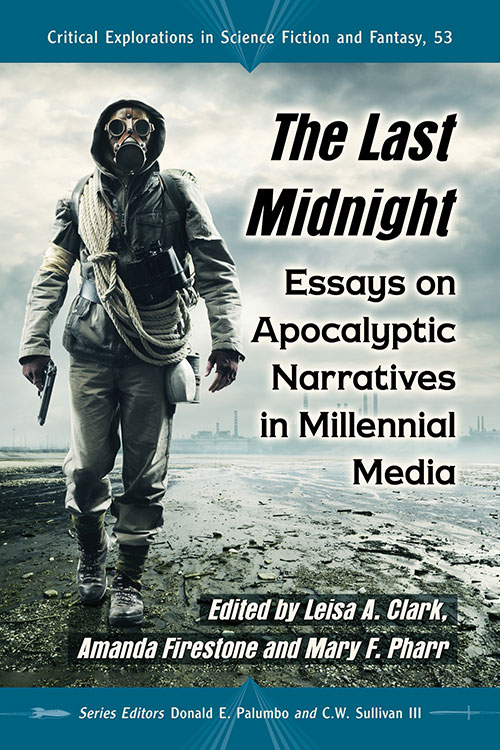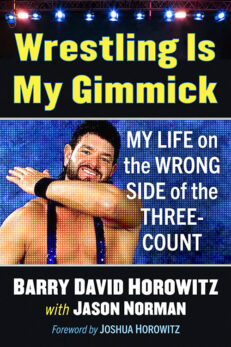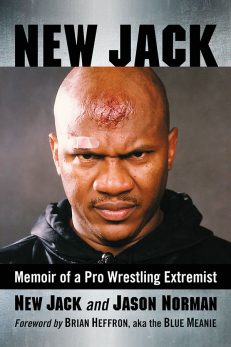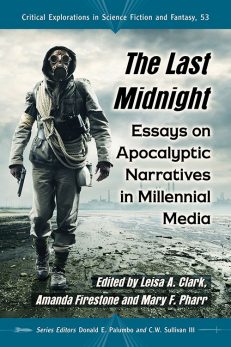The Last Midnight
Essays on Apocalyptic Narratives in Millennial Media
$39.95
In stock
About the Book
Do you find yourself contemplating the imminent end of the world? Do you wonder how society might reorganize itself to cope with global cataclysm? (Have you begun hoarding canned goods and ammunition…?) Visions of an apocalypse began to dominate mass media well before the year 2000. Yet narratives since then present decidedly different spins on cultural anxieties about terrorism, disease, environmental collapse, worldwide conflict and millennial technologies. Many of these concerns have been made metaphorical: zombie hordes embody fear of out-of-control appetites and encroaching disorder. Other fears, like the prospect of human technology’s turning on its creators, seem more reality based. This collection of new essays explores apocalyptic themes in a variety of post-millennial media, including film, television, video games, webisodes and smartphone apps.
Instructors considering this book for use in a course may request an examination copy here.
About the Author(s)
Bibliographic Details
Edited by Leisa A. Clark, Amanda Firestone and Mary F. Pharr
Series Editors Donald E. Palumbo and C.W. Sullivan III
Format: softcover (6 x 9)
Pages: 280
Bibliographic Info: notes, bibliographies, index
Copyright Date: 2016
pISBN: 978-1-4766-6323-4
eISBN: 978-1-4766-2526-3
Imprint: McFarland
Series: Critical Explorations in Science Fiction and Fantasy
Table of Contents
Acknowledgments xii
Preface (Amanda Firestone) 1
Introduction (Mary F. Pharr, Leisa A. Clark and Amanda Firestone) 4
Prelude—We Don’t Want to Miss a Thing: Millennial Technologies of Participation and Intimacy (Andrew McAlister) 25
I: Culture, Values and Anxiety
The South Will Rise Again: Contagion, War and Reconstruction in The Walking Dead, Seasons One Through Five (Angela Tenga) 37
The Recuperation of Wounded Hegemonic Masculinity on Doomsday Preppers (Tiffany A. Christian) 48
The Last Non-Judgment: Postmodern Apocalypse in Battlestar Galactica (Stephen Joyce) 60
The Emergence of the Lost Apocalypse from 28 Days Later to Snowpiercer (Mark McCarthy) 69
II. Globalization, Corporate Power and Class Struggles
Going Viral in a World Gone Global: How Contagion Reinvents the Outbreak Narrative (Dahlia Schweitzer) 79
The Second Coming of Left Behind and the Deglobalization of Christian Apocalypse (Tim Bryant) 90
Corporate Abuse and Social Inequality in RoboCop and Fido (Bill Clemente) 101
We Go Forward: An Inquiry into The Hunger Games and Other Class-Based Dystopias in Millennial Cinema (Lennart Soberon) 112
III. Memory and Identity
Determined About Determinism: Genetic Manipulation, Memory and Identity in Shaping the Postapocalyptic Self in Dark Angel and Divergent (Max Despain) 123
The Apocalyptic Mental Time Travel Film: Erasing Disaster in Edge of Tomorrow and X-Men: Days of Future Past (Ryan Lizardi) 134
In the Flesh: The Politics of Apocalyptic Memory (Frances Auld) 144
In Search of a New Paradise and the Construction of Hell in The 100 (Ceren Mert and Amanda Firestone) 154
IV. Simulation, Psychology and Inevitability
The Apocalypse Will Not Take Place: Megamonster Films (Cloverfield, Pacific Rim, Godzilla) in the Postmodern Age (Sharon Diane King) 165
Psychological Significance Within Postapocalyptic Film: Two Unique Approaches to Adaptation (Patrick L. Smith) 174
“To Err Is Human”: The Human Species and the Inevitable Apocalypse in The World’s End (Mary F. Pharr) 185
V. Being Human in a Techno-Universe
More Man Than Machine: The Construction of Body and Identity in Battlestar Galactica and Terminator: The Sarah Connor Chronicles (Leisa A. Clark) 195
Techno-Apocalypse: Technology, Religion and Ideology in Bryan Singer’s H+ (Eddie Brennan) 206
Technoscience as Alien Invasion in XCOM: Enemy Within (Bjarke Liboriussen) 216
Running for My Life: Convergence Culture, Transmedia Storytelling and Community Building in the Smartphone Application Zombies, Run! (Amanda Firestone) 226
Appendix: Apocalyptic Criticism, Films, Television Series and Video Games (Leisa A. Clark, Mary F. Pharr and Amanda Firestone) 237
About the Contributors 247
Index 251






